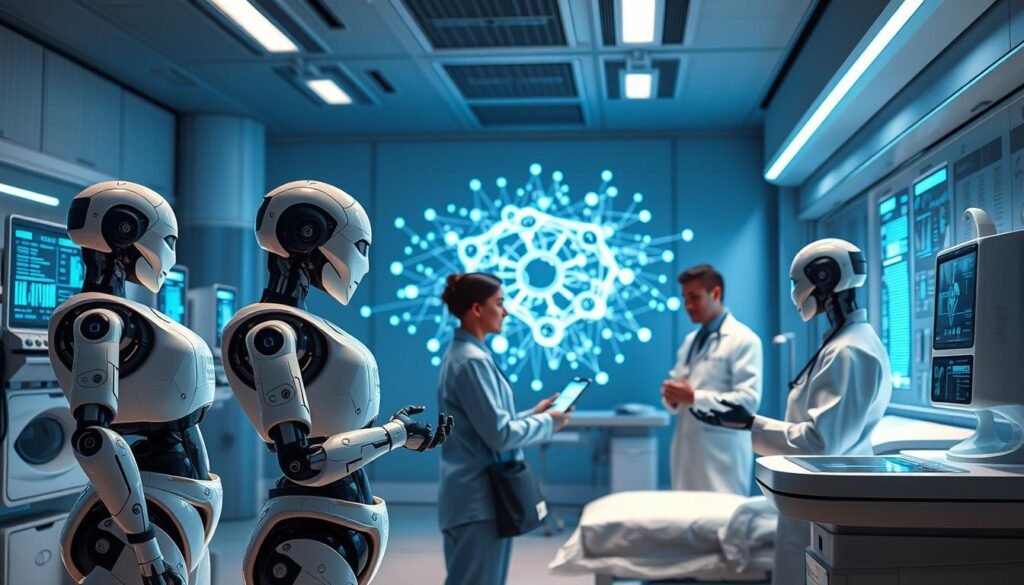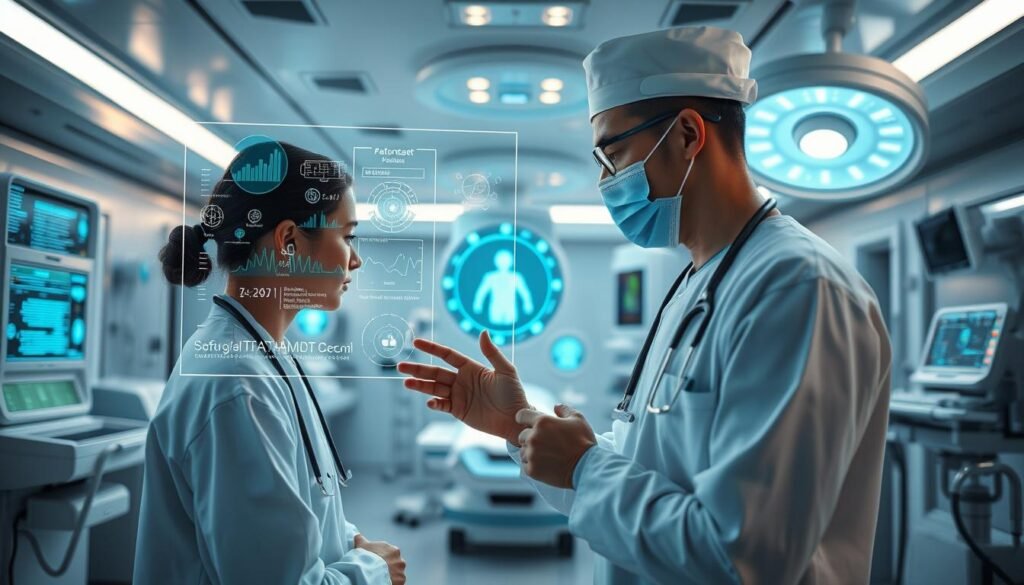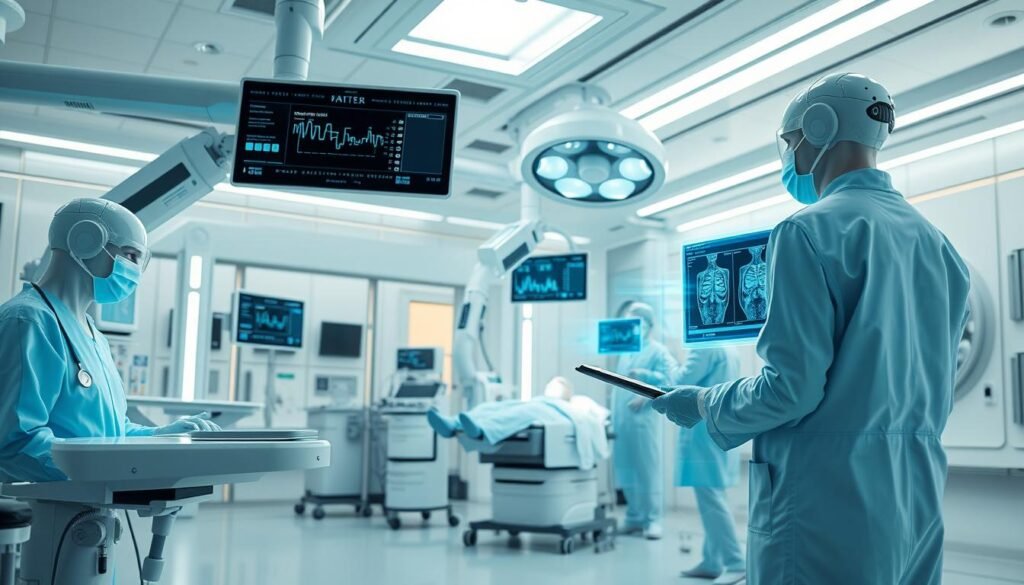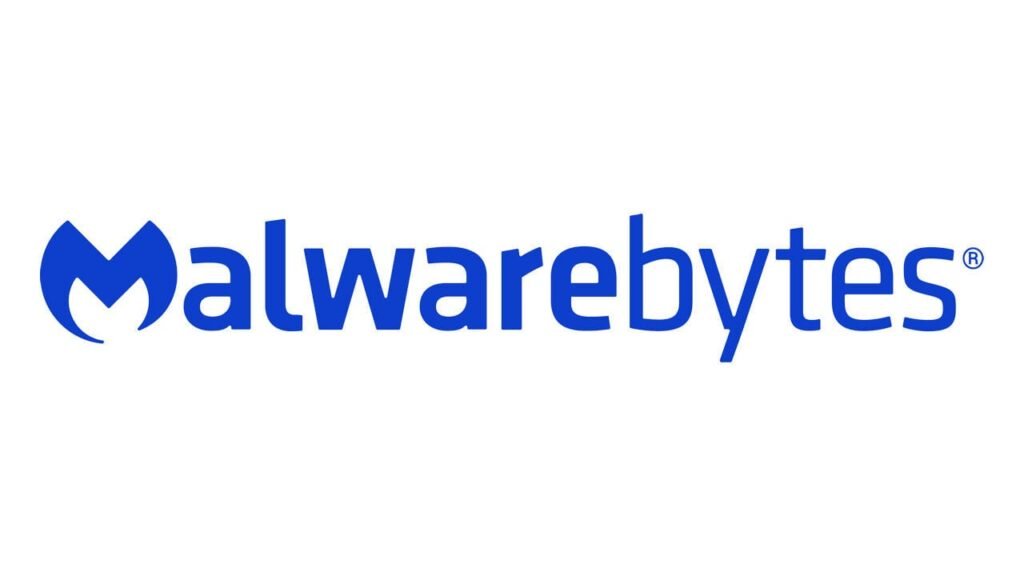Did you know that by 2030, the world could face a huge shortage of 18 million healthcare workers? This includes 5 million doctors, at a time when demand is soaring. The medical field is turning to AI to tackle these big challenges.
Leaders like Satya Nadella and Tim Cook see AI as a game-changer. Yet, AI is still not widely used in healthcare. But, over 25% of health systems are starting to use AI to improve care and patient experiences1.
AI is helping with high costs and managing chronic diseases. It leads to better diagnoses, treatments tailored to each patient, and more efficient operations. Adopting AI in healthcare is not just a choice; it's a must for the future of medical care.
Key Takeaways
- • Implementing AI in healthcare can help tackle the looming workforce shortages predicted by 2030.
- • AI technologies are already improving patient care, diagnostics, and operational workflows across healthcare systems.
- • Despite current limitations, more health systems are planning to adopt AI solutions for enhanced care delivery.
- • AI-driven tools are showing promising results in areas like medication adherence and billing accuracy.
- • The evolving landscape of AI in healthcare indicates a shift towards indispensable skillsets for medical professionals.
The Transformative Potential of AI in Healthcare
Artificial intelligence in healthcare is changing the game. It can quickly look through huge amounts of data to find patterns humans might miss. This helps doctors make better diagnoses and tailor treatments to each patient.
Many Americans think AI will soon be better at diagnosing than doctors. In fact, 2 in 3 believe this, showing a lot of trust in AI2. Also, 48% are hopeful about AI making healthcare better, showing they see its value2.
AI does more than just help with diagnoses. It makes healthcare systems run smoother, with 43% seeing better accuracy as a big plus2. Even more, 64% of patients want AI to help them 24/7, not just nurses3. AI is also great at helping with medication, especially with insulin, where 70% of patients struggle3.
The AI healthcare market is growing fast, from $11 billion in 2021 to $187 billion by 20303. A big 58% think AI will change healthcare more for providers than for patients2. As we keep using these technologies, AI could really help healthcare professionals, make things run better, and help with research. It's opening up new ways to care for people in the future.
Understanding Artificial Intelligence in Healthcare
Artificial intelligence (AI) uses AI techniques like machine learning and natural language processing. It changes the face of healthcare technology. The AI market in healthcare was around US$1.4 billion in 2018. It's expected to hit US$17.8 billion by 20254.
In North America, the market hit US$1.15 billion by 20204. This shows a big need for AI in healthcare.
Healthcare is facing more patients and higher costs. AI is key to solving these problems. It helps with diagnosing, planning treatments, and watching patients. AI can be more accurate than doctors in some cases4.
IBM has created Watson for healthcare. It uses natural language processing to improve care5.
Hospitals are starting more AI projects. A study found 87 AI projects in a Canadian hospital4. But, using AI in everyday care is hard. There are few models ready for real use4.
AI also struggles to fit into current workflows and systems5.
Knowing about artificial intelligence definitions helps healthcare workers use AI well. AI can make healthcare better by being more efficient and accurate. It helps with better treatments and diagnoses.

Benefits of AI in Clinical Decision Making
Artificial intelligence is changing how doctors make decisions, giving them better tools for diagnosing and treating patients. Studies show AI can make diagnoses more accurate, leading to better health outcomes. This part explores how AI, especially machine learning and personalized treatments, improves healthcare.
Enhanced Diagnostics through Machine Learning Algorithms
Machine learning helps doctors by analyzing lots of medical data. For example, AI is great at spotting problems in medical images like X-rays and MRIs. It can even find cancer cells in breast tissue and diagnose eye diseases from photos6.
More doctors are using AI tools, and research shows they work better than old methods7.
Personalized Treatments with AI-Powered Insights
AI helps create treatments that fit each patient's needs. It looks at a patient's genes and health history to suggest the best treatments. This approach aims to make treatments more effective and less likely to cause side effects.
Healthcare leaders are working together to use AI for more personalized care. They expect AI to be widely used in healthcare by 20287. Studies show AI-supported treatments can make patients happier and more likely to stick to their treatment plans8.

Implementing AI in Healthcare: Key Applications
AI has made big changes in healthcare, especially in predicting diseases and finding new drugs. It uses big data to forecast health risks and suggest ways to act. This helps improve patient care and use healthcare resources better.
Predictive Analytics for Disease Prevention
Predictive analytics looks at past health data to spot disease patterns. The FDA lists over 700 AI-enabled medical devices, showing AI's big role in healthcare9. It helps doctors make quicker, more accurate diagnoses. This leads to catching diseases early and changing how healthcare meets patient needs.
AI-Driven Drug Discovery
AI speeds up finding new drugs by analyzing genetic data and clinical trials. It changes old ways, cutting costs and time. AI helps health systems use resources better and bring in new money through better patient care9. It also finds treatments quicker, improving drug development and patient care.

The Role of Natural Language Processing and Computer Vision
Natural Language Processing (NLP) and computer vision are changing healthcare AI. NLP helps doctors manage lots of medical notes. It makes it easier to find important info and cuts down on paperwork.
NLP is key in handling clinical notes and reports. It helps manage patient records and test results. It also makes clinical decisions better, making work easier10.
Computer vision is making diagnosis better by analyzing images. It's used in radiology and pathology to spot diseases early. This leads to better patient care11.
Using NLP and computer vision together makes healthcare AI smarter. It will lead to better visual recognition and text generation. This could make doctor-patient talks smoother and care better11.
The future of NLP and computer vision is bright. It will bring new ways to interact with healthcare. This could change how we get medical care for the better.



